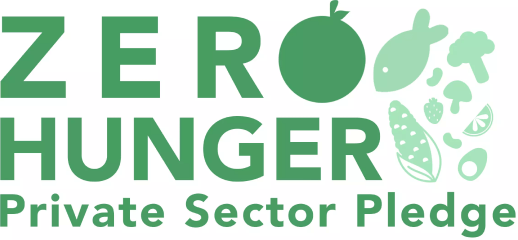
Converting pledges to action
Hunger and malnutrition devastate the world. Ending these two scourges and achieving SDG 2 has a steep cost – estimated between USD 330 billion and USD 500 billion. This requires a collective effort that mobilizes both the private and public sectors.
For this reason, during the inaugural United Nations Food Systems Summit (UNFSS) in 2021, we launched, together with partners, the Zero Hunger Private Sector Pledge (ZHP). The ZHP calls on the private sector to join the global movement to end hunger.
But ending hunger and malnutrition requires more than resources. It requires a commonly agreed roadmap of priorities based on interventions that have been proven to have the greatest impact. The ZHP challenges companies to align their investments with 10 high-impact intervention areas in 90 priority countries recommended by the Ceres2030 research to achieve zero hunger by 2030. Such investments can be made in the form of core business investments or cash, in-kind, or subsidized contributions. Any Pledge made by a company is thus underpinned by scientific consensus.
Two years in, 50 companies committed nearly USD 575 million for sustainable agriculture and food systems transformation in 48 countries. While this is impressive, a further step is needed: converting pledges to action.
Accountability is key to initiatives such as the Pledge. It ensures that companies are indeed held accountable to translate the commitments they make to action, and that such action contributes to sustainable agriculture and food systems transformation. This year, during the UNFSS+2 in July, we announced the ZHP accountability framework to verify the progress made towards implementing concrete projects in priority countries. This led to the ZHP’s first reporting exercise, the results of which are now summarized in the report, From Pledge to Action: Assessing progress of the Zero Hunger Private Sector Pledge and pledging companies towards SDG 2.
As part of the reporting exercise, independent evaluators examined the progress of 16 companies which had made pledges of at least USD 1 million before the end of 2022. Of those 16 companies, 14 provided information and means of verification attesting to their investments deployed between 2021 and 2022 in alignment with the ZHP’s priority themes and countries. The ZHP’s first Accountability Report confirms that these 14 companies are indeed moving from pledge to action, with $140 million invested to date through 103 projects in 46 countries.
These findings reiterate the important role of the private sector in achieving SDG 2. However, we should not just look at the private sector for accountability. Other stakeholders, including our own organizations as technical and implementing partners in the ZHP, have an equally important role and responsibility to play if we are to fill the financing gap and achieve SDG 2. The report’s findings strengthen our resolve to continue driving even more and meaningful pledges and action through the ZHP. For this reason, we are raising our ambition. We now
- Call on the private sector to contribute to our new target of 100 companies pledging USD 3 billion by the next UNFSS stock-take in 2025; and
- Commit to continue holding the ZHP and pledging companies accountable, with a second and stronger accountability exercise for the next UNFSS stock-take in 2025.
We hope that you will join us. Together, we can move closer to ending hunger and malnutrition by 2030.
Lawrence Haddad is the Executive Director of GAIN and Carin Smaller is the Executive Director of the Shamba Centre for Food & Climate.
